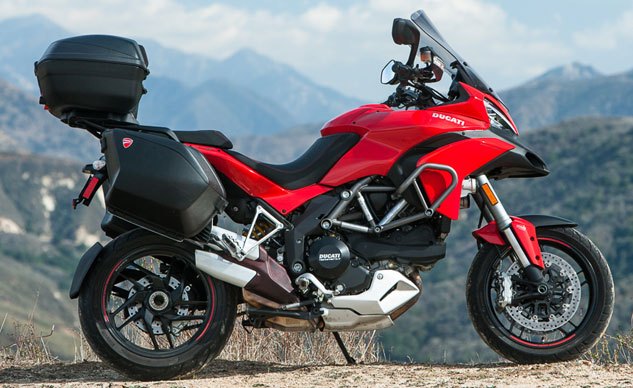
- Specs
- Print
- Email a Friend
Photos by: Evans Brasfield
2014 Ducati Multistrada 1200 Grandturismo
Editor Score: 85.25% | Engine | 18.75/20 |
| Suspension/Handling | 14/15 |
| Transmission/Clutch | 8.5/10 |
| Brakes | 9/10 |
| Instruments/Controls | 3.75/5 |
| Ergonomics/Comfort | 9.25/10 |
| Appearance/Quality | 8.5/10 |
| Desirability | 7/10 |
| Value | 6.5/10 |
| Overall Score | 85.25/100 |
"I think you're really going to like this bike," E-i-C, Kevin Duke, says to me, handing over the keys to the then just introduced 2010 Multistrada 1200. "We'll see about that," I thought, "but it at least looks a helluva lot better than its predecessor." Turns out I did like it – a lot. In fact, were I not shackled with the responsibility of riding whatever new model press bike is currently residing in my garage, I'd own a Multistrada.
Since reviewing the original Multi 1200, we've compared it, or its Touring S derivative, to a number of other motorcycles including the BMW R1200GS and Triumph Explorer. We've also stacked it up against bikes such as Honda's VFR1200F and Kawasaki's Z1000 in our Oddball Sport-Touring Shootout. Our highest accolade is when we named the newly introduced model with Skyhook suspension, our choice for 2013's Sport-Touring bike of the year.
With all our coverage, we had yet to taste the latest version of the Multistrada with its long-haul accoutrements, the Granturismo.

A more upright seating position by virtue of 20mm taller handlebar risers doesn't hamper the GT's cornering prowess. Note the included crash bar and fog light (there's a matching set on the opposite side).
What, exactly, differentiates the Granturismo from its lesser-adorned counterparts? Twenty-three hundred greenbacks worth of accessories meant to make life on the road a bit more palatable. These luxuries include a 48-liter top box with mounting hardware, a larger windscreen, LED fog lights, saddlebags with 15 liters of more storage space (compared to the Touring's saddlebags), 20mm taller handlebars and crash protectors.

The taller windscreen on the Granturismo is manually adjustable on-the-fly to rider preference.
In addition to the increased price, you're also paying a weight penalty of approximately 24 pounds, a claimed 540-pound wet weight for the Granturismo vs. 516 for the S Touring model.
Besides the niceties mentioned above, the $19,995 S Touring model is equally equipped to the $22,295 Granturismo, both outfitted with Ducati's Skyhook suspension, Ride Modes, Power Modes, Ducati Safety Pack (ABS & DTC), heated grips and a center stand.
How The 2013 Ducati Multistrada 1200S' Skyhook Suspension Works
Missing from both Multi models is cruise control – a glaring omission for an apex sport-touring bike that uses ride-by-wire throttle control, which already has the substructure to support the implementation of cruise control. Honestly, going forward, we don't see how any serious sport-touring or touring motorcycle can be considered as such without the inclusion of cruise control. The technology is too ubiquitous among the two genres to be overlooked.

Luggage is lockable and easily detaches, leaving the bike without ugly mounting bracketry. The saddlebags hold 15 liters more than the S Touring model. Attachment points are plastic and we're dubious of their damage resistance in even a light crash.
Besides the cruise control issue, the Multistrada Granturismo enhances the long-distance experience in what has become a blurry niche of motorcycling – the Sport-Adventure-Tourer. Identified by its longer-travel suspension, SATs combine the attributes of Sport-Tourers and Adventure-Tourers into a soccer mom's SUV of motorcycling. Outfitted with Pirelli Angel GT tires, at least the Granturismo makes no pretense of going off the pavement like its siblings do with their Pirelli Scorpion Trail tires.

Must have accidentally spiked the hydro pak with whiskey because taking this $23K, 540-pound Italian with street tires off road can be foolhardy. Guess we wanted to prove that it can be done, but we don't recommend going far off the beaten path.
Passengers will like the Multi GT because its 48-liter top box includes a backrest – making an already comfortable bike even more so. Riders will like the bike because with the push of a button you can adjust suspension preload and engine characteristics – or for all the other reasons we named it our pick for best Sport-Touring bike of 2013.

We've come to appreciate the clean, legible readout of the Multistrada's all-digital display. Navigation, once familiarized, is a simple operation. Electronic suspension adjustment makes being lazy, easy.
The question needing answered is, do the few upgrades on the GT model justify its $2,300 upgrade. If it had cruise control in addition to the other elements, yes, definitely. As is, though, we'd be hard pressed to spend the additional dollars over the S Touring version.
However, if you're in the market for a new Sport-Adventure-Tourer there's two things you need to consider: the new KTM 1190 Adventure and forthcoming Aprilia Caponord.
The 1190 Adventure doesn't have cruise control, but it does have an electronics package equal to that of the Ducati's, including electronically adjustable suspension, R-b-W throttle, traction control, switchable ABS and Ride Modes all for $16,499 ($500 less than the base model Multistrada).
+ Highs - Emphasizes Sport in Sport-Adventure-Tourer
- Skyhook suspension
- Comfy ergos
| – Sighs - Expensive
- No cruise control
- Value deficit
|
We're attending the Aprilia Caponord press launch this week, and it'll be interesting to find out how this pair of Italian 1200cc V-Twins match up. The Caponord brings all the tech offered on the Ducati (semi-active suspension, switchable ride modes, ABS and traction control) and adds electronic cruise control. More impressive is that Aprilia offers all these features – plus hard bags – for a price that is a relative bargain: $15,499.
Sounds like a shootout is brewing to determine if the Multistrada remains the dominant Sport-Adventure-Tourer or if the competition has now beaten Ducati at its own game.




















